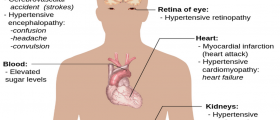
Because the onset of preeclampsia can be sudden, it is important to take the symptoms of this condition seriously. Incidentally, preeclampsia can start slowly and become a serious problem very quickly, or develop gradually, or remain mild. But the pathology of preeclampsia is unpredictable, and any of the symptoms that are associated with it can be of concern to obstetricians. Given that the only "cure" for preeclampsia is giving birth, the earlier in pregnancy it shows up, the more dangerous it tends to be. What has this got to do with high blood pressure, you might ask? The answer is simple, yet complicated.
Because one of the consequences of preeclampsia is the fact that blood vessels become constricted, high blood pressure and preeclampsia go hand in hand. Hypertension can easily occur in pregnant women without the presence of preeclampsia, but it is often the only visible preeclampsia symptom. Therefore, many doctors find a highly elevated blood pressure to be a cause of concern all in itself. If you have symptoms such as frequent headaches, changes to your vision, intense pain, dizziness during the third trimester, and nausea and vomiting in a stage of pregnancy when morning sickness is not usually present, it is important to alert your doctor.
However, most cases of preeclampsia are diagnosed during routine prenatal appointments. If you have a high blood pressure as well as protein spillage in your urine, that means a certain diagnosis of preeclampsia, even though none might be present. In the final weeks of pregnancy, many doctors use this as a basis to recommend immediate induction of labor, or a c-section. If not treated, preeclampsia can turn into eclampsia, a condition that causes seizures and is life-threatening.
- www.cdc.gov/bloodpressure/pregnancy.htm
- medlineplus.gov/highbloodpressureinpregnancy.html
- Photo courtesy of Pilirodriguez by Wikimedia Commons: commons.wikimedia.org/wiki/File:Preclancia_(1).jpg

















Your thoughts on this
Loading...